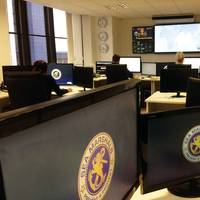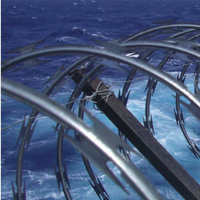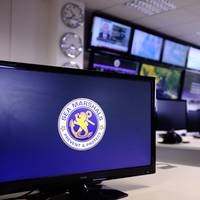Sea Marshals Showcases Management System in New Premises

International private maritime security company Sea Marshals Ltd. has expanded into new premises to cope with its growing workload, particularly in the Gulfs of Guinea and Aden. Sea Marshals marked its expansion with an open evening held at its new 4,500 square feet center of excellence for maritime security, alongside the Millennium Stadium, boasting excellent transport links on its doorstep and Cardiff Bay only minutes away. The large operations center is manned 24/7 to support the 120+ personnel currently at sea protecting vessels…
Sea Marshals Urges Ship Operators to Stay Vigilant

The threat to maritime trade from Somali pirates continues, and ship operators should stay vigilant and adhere to best management practices, according to private maritime security company Sea Marshals Ltd, which counsels against complacency at this time. Latest security industry intelligence points to a likely upsurge in pirate attacks, particularly given recent releases of hijacked vessels and a reduction in attack success rates. Thomas Jakobsson, Chief of Operations for U.K.
Counter-piracy: Sea Marshalls to Set Up Cape Verde Base
To thwart escalating piracy in the Gulf of Guinea, Sea Marshalls gets license to use Cape Verde as base for ship security operations. The Government of Cape Verde earlier granted a licence to Cape Verde Maritime Security Services (CVMSS) allowing it exclusive rights to vet Private Maritime Security Companies (PMSCs) who want to use the island as a base for embarking and disembarking armed security teams. Sea Marshalls is the first company to obtain its approval. On behalf of the Cape Verde Government, CVMSS will undertake checks to ensure PMSCs comply with agreed minimum standards in accordance with both local and international laws and regulations. These standards will include training, support and insurance levels.
Cape Verde Leads Fight Against West African Piracy
In a move designed to thwart the escalating piracy in the Gulf of Guinea, the Government of Cape Verde has granted a licence to Cape Verde Maritime Security Services (CVMSS) allowing the company exclusive rights to vet Private Maritime Security Companies (PMSCs) who want to use the island as a base for embarking and disembarking armed security teams. And UK-headquartered SeaMarshals Ltd is the first company to be granted a permit to use Cape Verde as its base for security operations in the West Africa region. On behalf of the Cape Verde Government, CVMSS will undertake checks to ensure PMSCs comply with agreed minimum standards in accordance with both local and international laws and regulations. These standards will include training, support and insurance levels.
Sea Marshals Expands Operations Center

Sea Marshals has expanded its UK Operations Centre and introduced the latest tracking technology to protect vessels under its protection. The company has transferred its Operations Centre to larger premises in Cardiff to accommodate its growing team of security consultants. The unit is staffed year-round, 24 hours per day, seven days a week, by expert personnel, most with Naval or Army backgrounds and experience in planning and tracking. Sea Marshals has also introduced a custom…
Sea Marshals Signs up to Elaborate Services
Sea Marshals has appointed maritime communications specialist Elaborate Communications to manage its public relations and media handling. Sea Marshals Ltd supplies both armed and unarmed security teams for vessels transiting in pirate infested waters. The company is run by experienced security sector professionals who are also ship owners. They work closely with various Flag States, governments, P&I clubs and ship owners to provide a comprehensive security operation. Headquartered in Cardiff, UK, Sea Marshals Ltd is fully licensed in Djibouti, Sri Lanka, Oman and South Africa for the use of military grade weapons and embarkation and disembarkation of security teams.
Sea Marshals Gains New Armed Guard Insurance
International maritime security specialist Sea Marshals Limited announced that it has gained insurance which complies with BIMCO’s new Guardcon standards. Launched this week, BIMCO’s Guardcon provides an industry standard contract for the employment of security guards on ships. In particular, it addresses concerns over the relationship between the Master and the Head of the Security team on board a vessel. The company signed documents for the policy at the end of last week to ensure that it was already in compliance with Guardcon before its industry launch. “Sea Marshals has worked hard to make sure we comply with Guardcon,” said Thomas Jakobsson, Chief of Operations for Sea Marshals. “Guardcon gives the whole industry a standard contract when using guards onboard ships.
Are Weapons the Answer to Counter Piracy?

This article is intended to help inform the debate on the use of arms, in particular, armed Sea Marshals, in the protection of vessels conducting commercial business. At the outset AKE acknowledges an interest through its support to GAC Solutions in the provision of maritime security services and support to maritime clients. This paper provides objective analysis of the situation confronting the maritime industry in respect of piracy, its growing effect on business, and the arming of ships.
President Bush Signs Homeland Security Appropriations Bill
President Bush signed into law the Homeland Security Appropriations Bill (H.R. 2555). The Department of Homeland Security released a fact sheet providing a breakdown of how the total $37.6 billion appropriation is to be allocated. The President ensured that “We're better securing our borders and transportation systems while facilitating the flow of legitimate commerce. Our Container Security Initiative will allow for the screening of high-risk cargo at the world's largest ports and intercept dangerous materials before they reach our shores; supporting the efforts to strengthen our air cargo security system for passenger aircraft; to expand research on cargo screening technologies.
Pilot Boats: Long Beach Pilots Go Far Out With New Boat
Jacobsen Pilot Service Inc., Long Beach Calif. Received a new 54-ft. (16.4-m) welded aluminum pilot boat from Hike Metal Products Ltd. in Wheatley, Ontario, Canada this past July. Hike Metal was approached in the early summer of 2002 after Jacobsen Pilots services owner Tom Jacobsen had conducted a thorough review of the market and read an article about a new Pilot Boat Hike had just built and delivered to Atlantic Canada. While Jacobsen needed a new vessel for the growing demand for Pilot services in Long Beach, he also wanted a modern vessel, specifically designed for function…
Vessels: Long Beach Pilots Receive New Boat
The waters off of Long Beach, Calif., could be considered a bit safer now, as Jacobsen Pilot Service Inc. this summer received a new 54-ft. (16.4-m) welded aluminum pilot boat from Hike Metal Products Ltd. Following an international trend, the ships calling the Port of Long Beach today are much larger — particularly the massive new containerships that can deliver more than 7,000 teu on one ship — and the pilots have to board further out to sea. Also, the rush periods now demand a bigger boat with more seating for pilots. After 9/11 Jacobsen Pilots partnered with the U.S. Coast Guard and the Sea Marshals to help deliver them to the incoming ships. The new pilot boat fulfills this mission when required.
Column: Port Security: A Historical Perspective
Dennis L. Bryant, Senior Maritime Counsel at the law firm of Holland & Knight, Washington, D.C., is a contributing editor of MR/EN. The first foreign terrorist attack inside the United States was not the aviation-based assault of September 11, 2001. Eighty-five years earlier, foreign terrorists attacked a vital marine port facility in the Port of New York and New Jersey. Lest we forget. Port security was first formally recognized as a national priority, and a Coast Guard mission, during the World War I era. Early on the morning of July 30, 1916, a tremendous series of explosions ripped through the waterfront at Black Tom Island in Jersey City, New Jersey. Even though Europe had been at war for almost two years, peace still reigned in the United States. Although officially neutral, U.S.
Senate Approves Major Port Security Bill
In late December, the United States Senate approved a 95-page bill to enhance security at our nation's ports. Action on counterpart legislation in the House may take place in a few weeks. S. 1214 is entitled the "Port and Maritime Security Act of 2001." Its primary sponsor is Senator Hollings of South Carolina. Provisions of interest include: (1) a private sector advisory committee to help the U.S. Secretary of Transportation address port and maritime security issues; (2) security vulnerability assessments at all ports and waterfront facilities; (3) local port security committees, with private sector participation; (4) Coast Guard "sea marshals" who may board and ride certain arriving vessels of high risk; and (5) loan guarantees and grants to help finance port security improvements.
USCG Will Enforce Security Zone For Super Bowl
The U.S. Coast Guard is establishing a security zone on the Mississippi River in New Orleans for Super Bowl Weekend (February 1-3, 2002). The security zone will extend from mile 92.6 to mile 98.2. From 5 p.m. local time on February 1 to 9:01 p.m. February 4, the COTP Traffic Control lights will be energized to control one-way traffic. must be moved outside the zone. From 5 p.m. to 10p.m., February 1, tank vessels carrying designated bulk hazardous liquids will be prohibited from entering the zone. During the fireworks display from 9:15 p.m. to 10 p.m., February 2, tank vessels will be prohibited from entering the zone. From 9 a.m., February 3 to 12:01 a.m. February 4, all vessels will be prohibited from entering the zone, except for local ferries with USCG Sea Marshals aboard.
The Maritime Transportation Antiterrorism Act of 2002
On March 20,the Maritime Transportation Antiterrorism Act of 2002 (H.R. 3983) was approved by the Subcommittee on Coast Guard and Maritime Transportation and then approved by the full Transportation Committee by a voice vote. Section 2 of the bill creates a new subtitle VI of title 46, United States Code, to establish a comprehensive national system of antiterrorism security enhancements. Chapter 701 of this subtitle contains provisions related to port security. New section 70102 of title 46 requires the Coast Guard to conduct port vulnerability assessments for U.S. ports, including an assessment of the vulnerability of each facility in a port, at which there is a high risk of a catastrophic emergency.
Maritime Transportation Anti-Terrorism Act Of 2002 Approved By House
Bipartisan legislation that establishes a comprehensive national system to increase anti-terrorism security at U.S. ports and waterways was approved by the U.S. House of Representatives on June 4. “The Maritime Transportation Antiterrorism Act of 2002” (H.R. 3983) was approved by a voice vote. - Rep. - Rep. - Rep. - Rep. The legislation approved by the House today also included the provisions from “The Coast Guard Authorization Act for Fiscal Year 2002” (H.R. 3507) which authorizes $5.9 billion for Coast Guard programs and operations during fiscal year 2002. H.R. 3507 was approved by the House in December 2001, but the Senate has continually refused to consider the bill.
Rear Admiral Paul Pluta Redefines Maritime Security
Rear Admiral (RADM) Paul Pluta, the man in charge of ensuring the security of the 361 ports and 95,000 miles of coastline in the U.S., had to quickly shift gears in the hours following September 11. Hired initially to beef up environmental protection and passenger vessel safety, Pluta realized after that day, that his role as Assistant Commandant for Marine Safety, Security and Environmental Protection, U.S. Coast Guard, had changed dramatically in the hours following. September 11 began like any other for RADM Pluta. Working out of his office in Washington, D.C. where he was appointed to earlier that year by Coast Guard Admiral James Loy…
Maritime Transportation Anti-Terrorism Act Of 2002 Approved By House
Bipartisan legislation that establishes a comprehensive national system to increase anti-terrorism security at U.S. ports and waterways — "The Maritime Transportation Antiterrorism Act of 2002" (H.R. 3983) — was approved by the U.S. House of Representatives on June 4. The legislation approved by the House also included the provisions from "The Coast Guard Authorization Act for Fiscal Year 2002" (H.R. 3507) which authorizes $5.9 billion for Coast Guard programs and operations during fiscal year 2002. H.R. 3507 was approved by the House in December 2001, but the Senate has continually refused to consider the bill. "Port security is an essential piece of an effective Homeland Security program," said Transportation Committee Chairman Don Young.
U.S. Port Security Fee Scheme
During a meeting of the Conference Committee that is attempting to draft a unified U.S. Port Security Fee be assessed to fund various port security initiatives. $1 per metric ton of other cargo. Based on calendar year 2000 data, this would collect approximately $692 million each year. The monies, to be collected by the Customs Service, would be deposited in a new Port Security Trust Fund. be allocated to ports for security enhancements. Of the remainder, 25 percent would be set aside for discretionary grants for protection of miscellaneous maritime assets and for shipper security programs and the other 25 percent would be available to generic security programs at the Maritime Administration, TSA, Customs, and the Coast Guard.
GOVERNMENT: Terrorism Threat and the Immediate Reaction
by Dennis L. When the federal government began examining United States vulnerabilities in the days following the horrific terrorist attacks of September 11, 2001, it quickly became apparent that significant weakness existed on the U.S. maritime borders. Many, but not all, of these weaknesses were systemic and derived from both the U.S. open society and the procedures underlying modern maritime commerce. The goal quickly became to reduce the risk of maritime terrorism while not fundamentally altering the efficiencies of the commercial system. It was quickly realized that the threat to the maritime sector consisted of two distinct types: explosives and other contraband being shipped as cargo (particularly in a container) and the ship being used as a weapon…
Coast Guard Increases Maritime Security
The Coast Guard has increased maritime security measures under Operation Liberty Shield. Operation Liberty Shield is a comprehensive national plan designed to increase protections for America’s citizens and infrastructure while maintaining the free flow of goods and people across our border with minimal disruption to our economy and way of life. Operation Liberty Shield is a multi-department, multi-agency, national-team effort. Hundreds of cutters, aircraft and small boats manned by thousands of Coast Guard active duty and reserve members are guarding the coast, ports and waterways. More Patrols - Security has been increased at major U.S. ports and waterways with more Coast Guard patrols by aircraft, ships and boats.
CG District Eight Offers Support
District, headquartered in New Orleans, are doing their part to increase vigilance and patrols. vessels arriving or departing from our ports; and enforcing security zones in and around critical infrastructure sites. duty, Reserve, Auxiliary, and civilian personnel. America.
The Irony Of Maritime Security
It now appears that the 107th United States Congress will enact new maritime security legislation during a lame-duck session to be held this month. This is ironic since both Senate and the House of Representatives passed maritime security bills months ago, the two measures were largely similar, and the two houses have been conferencing on development of a joint measure for some time. The purpose of this paper is not to dwell on the issues that delayed earlier passage of the measure. Rather, it is to review what new maritime security measures have been adopted by the various federal agencies utilizing their existing authority. As with the beginning of U.S. involvement in WW II and the Korean War, the War against Terrorism has started out as a 'come as you are' event.









